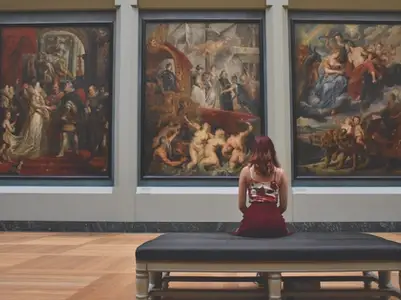Those that are culturally savvy value aesthetics and the best things in life.
According to the Russian author Anton Chekhov: “To feel comfortable among educated people, to be at home and pleased with them, one must be cultured to some extent.” But what exactly does it entail to be culturally savvy? These are a few interpretations that have been proposed:
Being well-educated is synonymous with having a strong cultural background.
Possessing a wide range of knowledge.
Having a high level of sophistication and refinement.
Possessing inquisitiveness, lack of bias, and a broad perspective.
having the ability to accept and even admire those who are different from ourselves.
Having a life of quality and insight.
You’ll find 20 of the best suggestions for enhancing your cultural knowledge below.
Those who are culturally literate can appreciate works of art. It takes a certain set of technical abilities and knowledge to truly appreciate master works of art like paintings, sculptures, prints, etc. Cultured people know how to analyse works of art in terms of their formal qualities, such as line, light, perspective, and composition. This can be accomplished in three ways:
Do something like enrol in a class titled “How to Look at and Understand Great Art.”
Learn about art by reading a book.
Even if it’s merely postcards of famous paintings, immerse yourself in art.
Recognize the top fifty works of art ever created.
A well-educated person should be familiar with all 50 of the world’s most famous paintings, be able to name the artist who created them, and be able to give a brief description of each. To learn more about art, you may either pick up a book like 50 Paintings You Should Know or look them up online.
2. Visit galleries and museums.
Don’t leave town without seeing the city’s finest exhibits in its museums and galleries. Include the most important museums in your country if at all possible. Naturally, it would be perfect if you could visit the best museums in the world, such as El Prado, the Louvre, the Metropolitan Museum of Art, and so on.
3. Number the 50 most impressive structures across the globe.
You should be familiar with some of the most iconic structures in the world, such as the Colosseum and the Chrysler Building. Not only that, but you need to know when they were constructed, for what purpose, and who constructed them. Start with the top 50 landmarks throughout the globe.
4. Recognize the top 25 sculptures from all over the globe.
From the Leshan Giant Buddha to the Winged Victory of Samothrace (or Nike of Samothrace), there are countless amazing sculptures from all over the world that any cultured person should be able to recognise.
To get started, you can either do some study online or use a book like Sculpture: From Antiquity to the Present Day as a starting point. A collection of excellent sculptures from all throughout the world is presented here.
5. Complete the Western literature canon by reading 50 works.
The term “canon of Western literature” refers to the body of works that are universally agreed upon by Western literary critics to have had the greatest impact on Western thought and society. What I mean is the books written in the Western tradition that are considered to be the pinnacle of literary achievement.
Many online resources provide listings of works that are considered canonical. This one can be found in Harold Bloom’s The Western Canon: The Books and School of the Ages, in the book’s appendix. Select 50 books at random and read them.
6. Explore works by authors from 25 nations.
The Western literary canon has an issue in that it doesn’t include the best works from the vast majority of the world’s countries. To close this gap, broaden your reading to include works from at least 25 other countries.
You can use Ann Morgan’s book list as a guide. For an entire year, she read literature from every country on Earth. Here is a rundown of the novels she’s read. Make a start by reading through 25 of them.
7. Get a Taste of 30 Different Cuisines, No Matter Where You Live.
Someone well-traveled in culture has tried dishes from a variety of cuisines. Depending on where you reside, it may not be necessary to travel far to enjoy a variety of regional cuisines.
To give just one example, New Yorker Charles Biblios has made it his life’s work to eat dishes representing every country in the world without ever leaving the city. Even if you don’t happen to reside in a particularly diverse metropolis, chances are good that you may find at least a small selection of ethnic eateries to satisfy your cravings. Create a list and check out each of these dining establishments.
9. Gain an Education in Religion
Understanding the world around us is facilitated by a familiarity with the core tenets, symbols, practises, founders, institutions, and values of the world’s main religions.
It is generally agreed that Hinduism, Buddhism, Confucianism, Taoism, Judaism, Christianity, and Islam are the world’s largest faiths. Follow these steps if you’re interested in learning more about these faiths:
Find a follower of the faith you’re interested in and have a conversation with them.
Go to the places of religion they frequent.
Read a book that concisely explains the key tenets of the religions you’re interested in learning more about. The World’s Religions is an example of such a volume.
Try looking into it online.
Explore options like Cultural Literacy for Religion, a web-based course.
10. Get into some classical music.
When people think of music that represents a culture, their minds immediately go to classical music. Start by listening to and becoming familiar with the 10 essential works of classical music.
Also, you can buy and listen to a collection called The 50 Greatest Pieces of Classical Music.
11. Know the top ten operas from throughout the globe.
The opera is an integral part of cultural life. Opera has the power to deepen our perceptions and perceptions of the world around us. We recommend Mozart’s The Marriage of Figaro to get things rolling (The Marriage of Figaro).
In the absence of actually being at an opera performance, viewing it on TV on a computer is the next best thing. Also, you may purchase a collection of the best arias ever written, like The 50 Greatest Opera Arias.
12. Know the Top 10 Ballets from Around the Globe.
The ballet, like opera, is an essential part of society. Attending a ballet is a great opportunity to see stunning choreography and hear some of the most memorable music ever created.
Pyotr Ilyich Tchaikovsky’s Swan Lake is a good place to start. The live performance of opera is unmatched by any other medium, although watching it on television is a close second.
13. Play Music from 35 Countries.
Listening to music from diverse cultures is just as important as reading books from different nations if you want to broaden your mind and understanding. Finding music from foreign nations is a breeze because to YouTube’s massive catalogue.
You can get started with some Panamanian music by listening to a Tamborito.
14. Check out a play.
Performing live is a vital art form that dates back to the Greeks. The best places to view a play are either on Broadway in New York or at Shakespeare’s Globe in London.
To get your feet wet, however, you need look no farther than your own city, where you may catch productions by both resident and visiting theatre companies.
15. Take in some international fare.
Watching a foreign film is a great way to get a taste of a culture you may never get to visit in person. You’ll come away from the experience with a deeper appreciation for other cultures and ways of thinking. The first in Krzysztof Kieslowski’s Three Colors trilogy, “Red” is a good place to start.
16. You should study good manners and etiquette as step number
In the beginning to this blog, I referenced Chekhov’s letter to his brother. Chekhov writes in this letter that well-educated individuals are consistently considerate, mild, and polite. The point is that well-educated people tend to treat others with deference.
Learning appropriate social conduct can help you treat people with the dignity they deserve. After all, having good manners makes interactions with others easier and more enjoyable. In addition, the most beautiful manners, not the greatest clothes, make the person who enters a room the centre of attention.
17. Read the news every day.
A well-educated individual is current on global financial and political affairs. Know not only the who, what, where, and when of a story of significance, but also its why. In addition, you should include your own suggestions about how to proceed.
18. Vacationing.
The finest method to broaden one’s cultural horizons and become well-rounded is through travel.
To add, “Travel is fatal to prejudice, intolerance, and narrow-mindedness,” as Mark Twain famously stated. Having the opportunity to meet people from different backgrounds through travel opens your eyes to the fact that, at our core, we are all really similar.
19. Take a Language Class.
Learning a new language is a great way to broaden your cultural horizons in a variety of ways. Here are just three examples:
As a first benefit, you’ll have a better grasp of cultural allusions and subtleties.
Secondly, it aids in your ability to understand new and unique points of view and methods of thinking.
As a third benefit, you’ll be able to sprinkle your speech with foreign words and phrases. This final one is quite pompous, but I guess that’s the point of being cultured, right?
One of the resources I’m utilising to study French is Duolingo, and I’ve been pleasantly surprised by how well it works. I suggest picking a language (French, since it is frequently considered the language of culture) and working through all of Duolingo’s courses for that language. In the end, you won’t be able to pass for a native speaker, but you will have a solid foundation in the language.
20. Make it a goal to learn and recite five poems in a row.
One sign of intelligence is the ability to think in metaphors and similes, and you can pick up this skill via reading poems. Moreover, they frequently refer to myth and literature, which might help you learn more about these fields. When all is said and done, great poetry is replete with vivid imagery and evocative language.
You should memorise five poems that you particularly enjoy. If you’re looking for something entertaining, try Lewis Carroll’s “Jabberwocky” (which I memorised in the 5th grade and have never forgotten). The following is a basic method for memorising poetry.
Summary
Learn to enjoy life’s better things and you’ll be well on your way to becoming a sophisticated, successful person. Twenty ideas are presented above to help you get going.


























